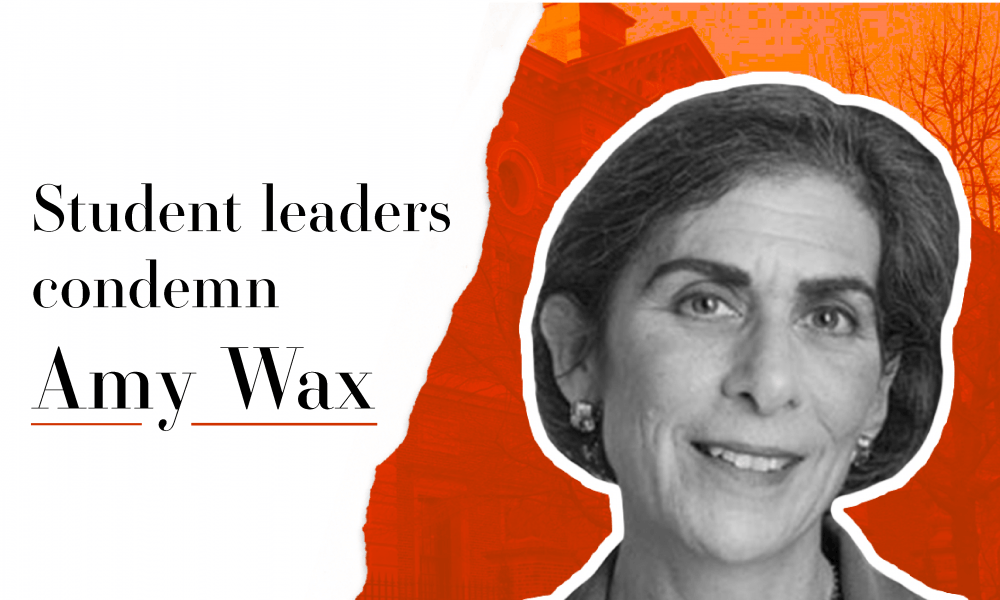
Student groups are firing back at Penn Law School professor Amy Wax's recent controversial comments and advocating for more diversity initiatives in response.
Several undergraduate student groups have argued that Wax's remarks on immigration have endangered students from marginalized backgrounds, referencing her remarks at the National Conservatism Conference and in a subsequent interview with The New Yorker.
The leaders of several undergraduate minority associations said they believed Wax's comments were outrageous, but did not think she could be terminated because of her status as a tenured professor. However, they are urging the Undergraduate Assembly to take other steps to address prejudice on campus.
United Minorities Council President and College junior Kevin Zhou said Wax's comments put marginalized communities at risk.
“It’s so dangerous to make a lot of these unsubstantiated generalizations about a specific group of people, about a culture, any community in general,” Zhou said. “There’s absolutely no authority or right for her to say such things.”
Wax declined to comment in an email to the DP.
In July, Wax delivered a speech at the National Conservatism Conference where she described different approaches to immigration policy. Wax said that one approach, which she called "cultural distance nationalism," would in effect mean “taking the position that our country will be better off with more whites than non-whites.”
A petition started after the conference by a Penn graduate demanding that the University fire Wax had garnered over 64,000 signatures as of Sept. 4. Wax responded to the backlash against her immigration stances in an interview with The New Yorker in late August, where she asserted she was not necessarily speaking in favor of the cultural distance nationalism approach, but was rather pushing that the concept receive more debate and attention.
“Well, I think that there is something to be said for [cultural distance nationalism] and I think that we should at least be talking about it,” Wax said. “I am saying this is a neglected dimension that gets no attention, no discussion.”
In the interview, which also covered definitions of racism and the differences between men and women, Wax implied Muslim countries are dirtier than Western nations.
“Adam Garfinkle said that if you go, for example, to Muslim countries or Arab countries, the indoor spaces are impeccable," Wax said. "People’s homes are pristine, but the outdoor space is a mess."
Nancy Ibrahim, vice president of the Muslim Students' Association and a College junior, said Wax's remarks caught her off guard and Wax’s employment runs contrary to Penn’s values of inclusivity and openness.
“I was really appalled that we even had a professor [at] this University making such derogatory comments,” Ibrahim said.
“Penn is definitely a university that values inclusivity and values diversity,” she added. “I see it as being really upsetting that we have a professor here who goes against those values that Penn holds so dearly.”
Zhou acknowledged that Wax's termination was unlikely.
“The bureaucratic barriers in having disciplinary actions against tenured professors are difficult," Zhou said.
Instead, Zhou hopes to see the Undergraduate Assembly and the University come up with an action plan to deal with prejudice more generally.
“Building a coalition, agreeing on some sort of implementable plan, having University support and just confront this irrational view is important,” Zhou said. “I want to see a willingness for [the] UA to take action.”
UA President and College senior Natasha Menon said the UA released an informal statement on its Facebook page over the summer, denouncing "Wax’s discriminatory remarks against minority groups that constitute our student body."
Menon said, however, the group plans on delaying formal action with regards to Wax’s statement until they consult with student groups potentially marginalized by her comments.
“We want to talk to these groups first before we respond [to] probably all of the comments professor Wax has made,” Menon said. She added that the UA feels it is especially important to reach out to the groups who wrote a guest column in the DP this summer denouncing Wax's comments.
Menon said, however, she hopes the UA resolution creates an action plan that goes beyond words of support.
Menon added the UA wanted to let affected organizations take the lead on Wax’s previous controversial statements, such as her comments about black Penn Law students in 2018.
“Because it was specific to black Penn Law students, because it was graduate students, I think GAPSA was much more involved than the UA,” Menon said. “Recently, because it has been a lot more generalized, that’s kind of why we felt the need to respond from the UA as well.”
In 2018, Penn Law barred Wax from teaching a mandatory first-year course after she said she had never seen "a black student graduate in the top quarter of the [Penn Law School] class and rarely, rarely in the top half.”
Wax is scheduled to take her sabbatical during the 2019-2020 school year, Penn spokesman Stephen MacCarthy said in July.
The Daily Pennsylvanian is an independent, student-run newspaper. Please consider making a donation to support the coverage that shapes the University. Your generosity ensures a future of strong journalism at Penn.
Donate







